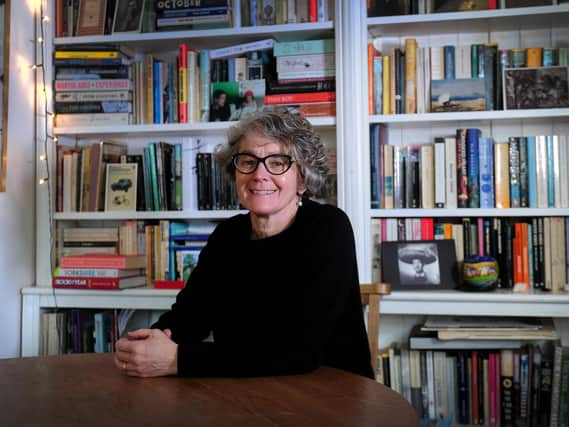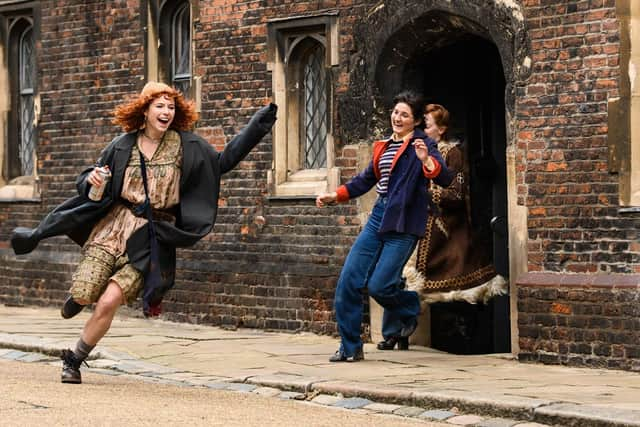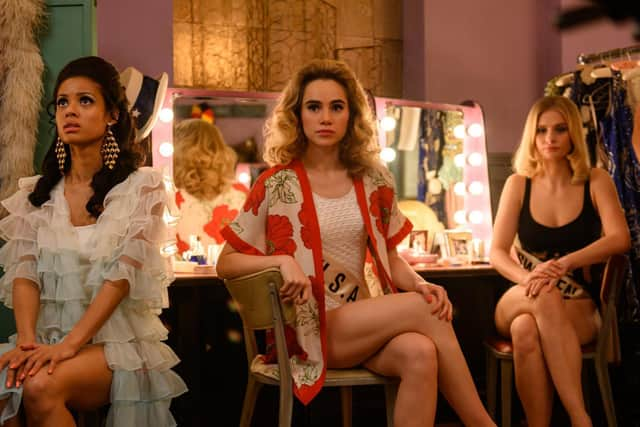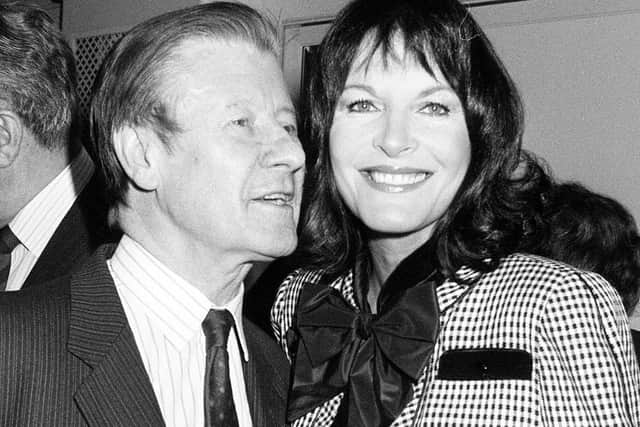New film Misbehaviour and the day feminism met Miss World


Since its inception by Eric Morley in 1951, the Miss World Contest had become one of the world’s biggest TV phenomena. Morley stipulated that contestants should be aged 17-23 and have “good teeth, plenty of hair and great legs”.
Years later, Morley’s wife and business partner Julia rebranded the contest as “beauty with a purpose”, emphasising charitable work performed by the title holder rather than parties and shopping.
Advertisement
Hide AdAdvertisement
Hide AdFor its first 20 years, no one voiced aloud any reservations about women being paraded and judged like livestock. All that changed on November 20, 1970.


The 1960s had seen the bloody, but successful, civil rights campaign in the US and anti-Vietnam War protests spreading from college campuses to Capitol Hill.
Second-wave feminism gave birth in the US to the women’s liberation movement – with bra-burning a metaphor for throwing off male sexual domination.
One signal of similar stirrings (without the bra-burning) came in 1968, when women sewing machinists brought Ford’s Dagenham car plant to a halt for weeks in a strike over equal pay. Their courage and sacrifice paved the way for the 1970 Equal Pay Act.


Advertisement
Hide AdAdvertisement
Hide AdGroups of women had begun to gather and question their place in society – one where few females entered Parliament, or reached the top in business and professions. Married women had to have their husband’s permission to get a loan from a bank or seek contraception. Single women were usually denied a mortgage.
Seeking a higher profile for their cause, a group of 50 so-called “women’s libbers” dressed up and infiltrated the glamorous audience at the Royal Albert Hall for the 29th Miss World Contest.
If ever there was an event that did not sit comfortably alongside the growing climate of protest, this was it.
American comedian and host Bob Hope was in the middle of a sexist shtick when Sally Alexander, a young single mother with academic aspirations, started off the protest with a football rattle.


Advertisement
Hide AdAdvertisement
Hide AdThe brave protesters bombarded stage and host with flour bombs, stink bombs and water pistols loaded with ink, before they were dragged away by police, still shouting their slogans.
In the space of a few chaotic minutes, women’s liberation hit screens and made headlines around the planet – and nothing would ever be the same. The contest was dropped by the BBC in 1988, although it’s still held annually.
Gaby Chiappe, co-writer of Misbehaviour, a new film about the Miss World Contest disruption of 1970 and events around it, remembers how, as a little girl, she and her family would watch the broadcast.
She ruefully recalls her primary school self saying “Oh no, she can’t win – her bottom’s too big”. She says the show was presented through what’s now called “the male gaze” – or masculine view of the world – which was not questioned.
Advertisement
Hide AdAdvertisement
Hide AdThis was hardly surprising, since TV at the time was overwhelmingly made and mostly presented by men.
A major part of writing the script – which took 18 months of Chiappe’s life in her office in north Leeds – involved setting aside 21st century feminist/human rights issues such as #MeToo and immersing herself only in the climate, experiences and prejudices of the 1970s.
“There was the objectification of the women, but also the post-colonial thing of BBC presenter Michael Aspel laughing at contestants who didn’t speak good English. It was astoundingly patronising – yet at the same time hugely celebratory of female beauty,” says Chiappe.
It was vital to the mostly female production team led by director Philippa Lowthorpe that the film did not deal in easy “goodies” and “baddies”.
Advertisement
Hide AdAdvertisement
Hide Ad“This was an earlier phase of feminism than the one I first experienced as a student in the 80s,” says Chiappe. “We’re talking about a time when women were not considered fit to run their own lives.”
After two decades of writing for top TV series from Family Affairs to EastEnders, Casualty, Vera and Shetland, she broke into film in 2016 with Their Finest, an adaptation of Lissa Evans’s Second World War novel Their Finest Hour and a Half, which starred Gemma Arterton and Bill Nighy.
What drew Chiappe to Misbehaviour was its fair representation of different points of view, and how it brings together various strands into a snapshot of key social issues and opinions.
“Nobody in the film is being forced into a comedy villain shape… It’s very respectful of different perspectives. There is also a true sense of how the main event became a focus for a collision of a new world crashing into the old one.
Advertisement
Hide AdAdvertisement
Hide Ad“You see the individual journeys of protesters Sally [Keira Knightley] and Jo [Jessie Buckley], but also the important viewpoints of the contestants, some of them representing developing countries which offered few opportunities for women. There’s actually a lot of joy in it, too.
“You also get the perspectives of the Morleys (Rhys Ifans and Keeley Hawes), and Bob Hope (Greg Kinnear).
“And the contest was set against the backdrop of the Anti-Apartheid movement, with black and white South African contestants both competing for the first time as Miss Africa South and Miss South Africa.
“On top of all that, a woman of colour won the contest for the first time that night. There’s a lot going on, and it’s handled beautifully.”
Advertisement
Hide AdAdvertisement
Hide AdThanks to a recently formed Leeds branch of Women in Film & Television (WFTV), the leading UK membership organisation supporting and promoting women across creative media, a preview screening of Misbehaviour is showing ahead of general release.
“I really wanted to bring this film to Leeds, to help showcase the international TV and film talent we have in the city and region,” says Barbara Govan, television producer and chief executive of Screenhouse Productions and co-founder of WFTV Leeds.
Chiappe will answer questions after the screening, and sure to be among them will be the woeful representation of female and BAME talent in UK-produced TV and film – a concern voiced at the recent Bafta awards. A similar lack of diversity among nominees at last month’s Academy Awards was also criticised.
According to the last calculation by the Writers’ Guild, only 14 per cent of prime-time TV drama in the UK is written or directed by women. Female speaking parts are also much thinner on the ground than those for men.
Advertisement
Hide AdAdvertisement
Hide AdBritish Film Institute research in 2013 revealed a similarly low level of participation from female writers and directors.
“It would be lovely if we only needed WFTV as a social thing,” says Chiappe. “But women are so under-represented despite being half the population. And BAME people are nearly 20 per cent of the population, but they sure as hell are not writing a fifth of TV and film scripts.”
She blames unconscious bias, among individuals who “think they would never discriminate against either women or people of colour”.
Even though executives often claim to have an “open door” policy towards ideas from all-comers, that is not enough, she says.
Advertisement
Hide AdAdvertisement
Hide Ad“The kind of people who respond are those who are already comfortable in that environment. You have to do more and work harder… you find them, the people who have great stories to tell but don’t think this is their world.
“If you actually want diversity you have to go out and get it.”
The Women in Film & Television screening of Misbehaviour will be held at the Everyman, Leeds, at 7.30pm on Wednesday. Non-member tickets: www.eventbrite.co.uk. Women in Film & Television: www.wftv.org.uk. Misbehaviour opens in cinemas on March 13.
